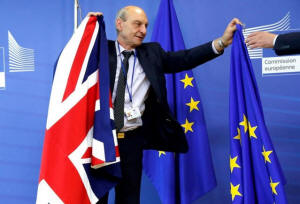|
Brexit fuels worries
about expected U.S. earnings recovery
 Send a link to a friend
Send a link to a friend
 [June 30, 2016]
By Caroline Valetkevitch and Noel Randewich [June 30, 2016]
By Caroline Valetkevitch and Noel Randewich
NEW
YORK/SAN FRANCISCO (Reuters) - Foreign exchange volatility and economic
uncertainty after Britain's vote to leave the European Union have
imperiled a projected profit rebound in the United States, where
companies have been stuck in an earnings recession since last year.
U.S. companies doing business abroad are at particular risk because of a
jump in the dollar since last week's referendum and expectations of a
potential stumble in European economies.
A strong dollar and plummeting oil prices slammed U.S. corporate
earnings starting in 2015, but the stabilization of crude prices and the
dollar in recent months has led investors to bet on a return to modest
growth starting in the third quarter.
As the second-quarter reports gets underway in the coming weeks,
executives' comments about the so-called Brexit's potential effects
could alter Wall Street's expectations of when the profit slump will
end.
"This adds more fuel to the fire, that the so-called spurt in growth in
the second-half of the year is going to be really tough to achieve,"
said Synovus Trust Company Senior Portfolio Manager Daniel Morgan, who
believes analysts are too optimistic.

This week, the average estimate for S&P 500 company third-quarter
earnings edged down to 2.2 percent growth from 2.4 percent growth the
day before the vote, according to Thomson Reuters data.
That could slip further as second-quarter reports get under way, which
has been the case in recent history. Second-quarter earnings are
forecast to decline 3.9 percent from a year ago.
Wells Fargo & Co, Citigroup and JPMorgan Chase & Co will be among the
earliest U.S. heavyweights to post second-quarter results, all reporting
in mid-July.
Some U.S. companies are already voicing caution about Brexit.
Cruise ship operator Carnival Corp warned in its quarterly report on
Tuesday that Britain's withdrawal from the European Union could affect
global consumer confidence.
Chief Financial Officer David Bernstein estimated on a conference call
that weakness in the pound and euro would have an eight-cent impact on
Carnival's full-year earnings per share, although he said higher
customer demand would make up for that and he did not reduce his
outlook.
BACK TO A RECORD? NOT SO FAST
While Carnival and other multinationals rely heavily on Europe,
including Molson Coors Brewing, which depends on Britain for a third of
its sales, the exposure of most U.S. companies is limited.
S&P 500 corporations overall depend on Europe for 8 percent of their
revenue, with just 1.9 percent of revenue flowing from Britain,
according to S&P Dow Jones Indices.
[to top of second column] |

EU and British flags are adjusted before the EU summit in Brussels,
Belgium, June 28, 2016. REUTERS/Francois Lenoir

And
while some economists warn of a European recession, European Central Bank
President Mario Draghi told EU leaders on Tuesday that Britain's decision to
leave the bloc could reduce euro zone growth by as much as 0.5 percent over the
next three years. Earlier this month, the ECB said the euro zone would grow 1.6
percent in 2016 and 1.7 percent in 2017 and 2018.
For investors hoping improved profits would help push stock prices to record
highs for the first time in 2016, Brexit has muddied the picture. The S&P 500
fell 5 percent following the vote, but has since regained most of that loss. It
now trades at 16.6 times expected earnings, above its long-term average of about
15, according to Thomson Reuters data.
The recent slump in the euro and other currencies will affect companies
dependent on foreign sales.
A U.S. dollar index is up 2.6 percent since Thursday's close, although it
remains down 2.7 percent for the year so far.
"That's really the factor that we have to watch," said Liz Ann Sonders, chief
investment strategist at Charles Schwab & Co.
Helped by higher crude prices, earnings in the energy sector on average are seen
falling 78 percent in the second quarter and then 54 percent in the following
quarter.
Recovering oil and stronger foreign currencies versus the dollar this year, even
following their recent Brexit-related losses, are key reasons to continue
expecting an earnings recovery in the September quarter, said Brad McMillan,
chief investment officer for Commonwealth Financial Network.

"We don't need them to get better -- although they are. We just need them to
stop dropping," McMillan said.
(Reporting by Caroline Valetkevitch and Noel Randewich; Editing by Alan Crosby)
[© 2016 Thomson Reuters. All rights
reserved.] Copyright 2016 Reuters. All rights reserved. This material may not be published,
broadcast, rewritten or redistributed. |